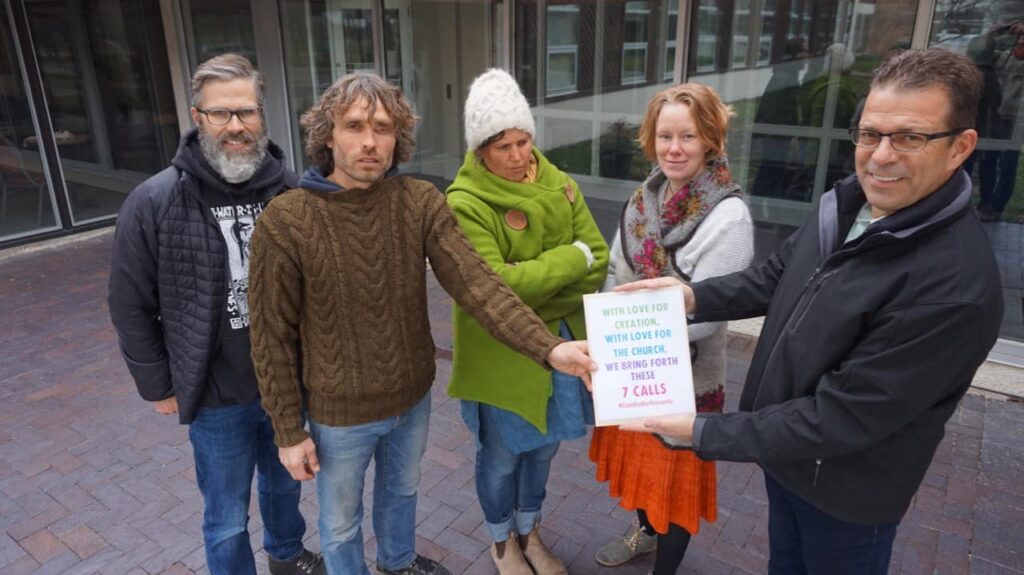The Earth is in trouble. As I write, international leaders, scientists and activists are meeting in Glasgow, Scotland, for COP26, a forum discussing actions the worldwide community must take to address the ongoing effects of climate change, effects that threaten every creature on our planet.
Even as world continues to grapple with the COVID-19 pandemic, right now we’re focusing our attention on another crisis, what many are calling a climate emergency.
In our confession of faith, Mennonites acknowledge, “Human beings have been made for relationship with God, to live in peace with each other, and to take care of the rest of creation” (Confession of Faith in a Mennonite Perspective, Article 6).
For decades, we have addressed the question of creation care through official statements, education, and through individual and congregational actions. There is the Creation Care Task Force, a cooperative effort among the members of Mennonite World Conference. There are the contributions of Mennonite Creation Care Network, with representatives from both Canada and the U.S. The recently created Sustainability Leadership Group was commissioned to work on behalf of Mennonite Church Canada. This magazine pays attention to the work of these groups as well as to other accounts about people taking concrete actions for creation care, particularly within Canada.
But for some in the Mennonite family, the denominational statements, the educational resources, and even congregational actions are not enough. They are calling our church to do more—right now. A new grassroots effort, 7 Calls to Action for Mennonite Church Canada, was launched on Oct. 31 and calls for our denomination to make a more drastic response.
“We are now in an emergency situation, facing an existential threat to humanity,” the group states on its website. “Our common home is literally on fire. We cannot afford years of further conversation with little, and sometimes, no action. We need ambitious, commensurate-to-the-crisis response, facilitated by courageous leadership. And we need it as soon as possible.”
The group calls for Mennonite Church Canada to “respond with bold urgency to our climate emergency” and to create a “Climate Emergency Mobilization Ministry” within our denomination to spur “vulnerable and risk-taking collaborative action transformation” of energy systems based on fossil fuels. There is a call to pay special attention to issues of justice for vulnerable populations like Indigenous communities.
The group calls the denomination to divest from companies based on fossil-fuel production and to offer an official affirmation of nonviolent civil disobedience “as an expression of Christian discipleship.”
This group has delivered their message directly to Doug Klassen, executive minister of MC Canada, but these kinds of action need the approval of the Joint Council, the representatives of MC Canada’s regional churches who make decisions on their behalf.
The 7 Calls to Action website suggests donations and fasting as ways to support the effort. It includes a place for individuals to sign their names in support of these calls. As I write, the list includes almost 100 names from five provinces, several U.S. states and the Philippines. There are younger signatories from ages 11 to 16.
“Time is running out,” the group writes. “We are calling on Mennonite Church Canada, our beloved faith community, to do its part. We are in a crisis, and we must boldly act to help save what God so loves. We believe we can do it!”
How do we respond to these seven calls? We can listen carefully to those who are already invested in this effort, and we can have conversation with those who make decisions on behalf of our denomination. We can prayerfully discern what God is leading us to do as caretakers of this fragile planet. And we can summon the courage to take next steps, with the Creator’s help.
Farewell
In this issue, you will see two articles written by Donna Schulz, CM’s Saskatchewan correspondent: “Saskatchewan Mennonites volunteer with Okanagan Gleaners” and “Seeing God in the lives of others.” These are Donna’s last articles, as she is stepping down from that role. She has been with Canadian Mennonite since 2013, faithfully reporting about the events and people of that province. She’s found interesting stories in many places and has written about them with care and sensitivity. We offer thanks for Donna’s valuable contributions and wish her well as she moves on to other ventures.
Read more editorials:
In the headlines
On the road toward wisdom
Ordinary time
Values that set us apart
Peace on the screen









Leave a Reply
You must be logged in to post a comment.